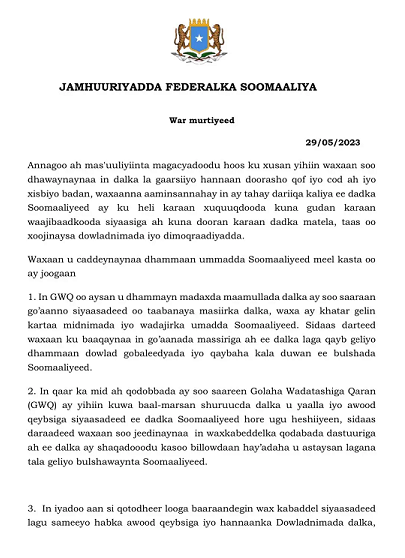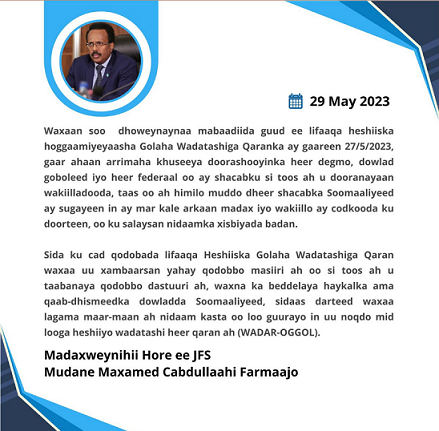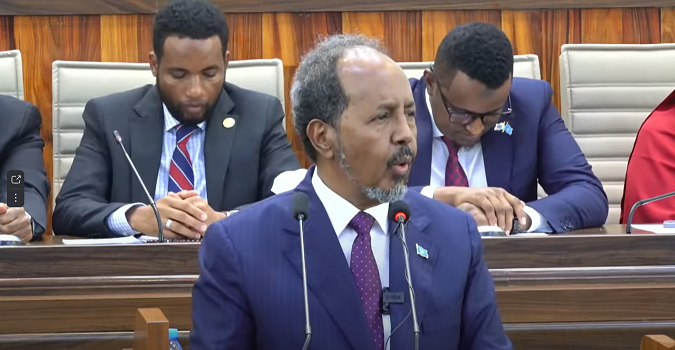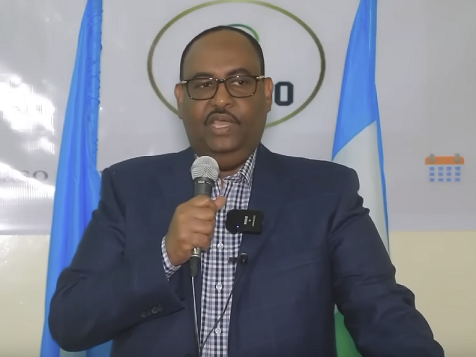
On the evening of May 27, the National Consultative Council (NCC) announced that a decision had been made by its eight participants present to overhaul the constitution, opening the way to direct voting. Despite the laudable goal, this has prompted an almost consensual public outcry as it appeared that the president and his pals are sugarcoating an illegal term extension and other political ends.
The NCC is an unconstitutional forum that brings together the federal government and the presidents of the regional states and which was originally designed to facilitate political dialogue between these stakeholders in the event of disagreement. However, President Hassan Sheikh Mahamoud perverted this goal to bypass the role of the Parliament when it comes to far-reaching national decisions.
This meeting in Mogadishu, and the previous one, did not include Puntland, whose leader Said Deni has stormy relations with the president of the federal government. Somaliland, which persists in its secession, was for its part represented by the Deputy Prime Minister.
Friends and foes realignment
The announcement of the agreed changes presented by the Interior minister Ahmed Moalim Fiqi raised immediately an uproar among the public and opposition also came from a group of high profile politicians, some of them hailing from President Hassan Sheikh’s own camp.

This group of prominent politicians opposed to the NCC’s plans was led by former President Sharif Sheikh Ahmed, four former prime ministers and a former speaker of parliament. Some of them were once part of the clan-based opposition organization that was instrumental in the unrest that helped Hassan Sheikh rise to power.
In their joint press release, they pointed out that some of the points issued by the NCC were in violation of the constitution and the power-sharing agreement that holds the country together. They added that “without a thorough [parliamentary] scrutiny of political changes with regard to the distribution of power and the structure of government and without the participation of all sectors of society, it can lead to mistrust and social division.”
Moreover, they called on the Parliament to fulfill its constitutional duties and to save the country from this current adventurism which does not serve the public interest and the process of reconstruction of this country bruised by three decades of civil war. They also urged the government to prioritize the fight against Al-Shabab and avoid any political moves that could cause a relapse.

Ironically, the agreement also got some unexpected support, like former president Mohamed Abdullahi Farmajo who came out of his self-imposed silence in exile. Former PM Mohamed Abdi Gedi also supported the move right after.
Farmajo’s stance to the NCC decision puzzled many of his supporters. Its short but subtle statement has been interpreted differently. He welcomed the intention to implement the so-called one person, one vote (1P1V) direct electoral system. However, he briefly slipped in his statement that any changes to the rules governing government must be agreed through a national dialogue.
The president went on the counteroffensive
The outcry prompted the president and his advisors to multiply the meetings to clarify the benefits for Somalia need to move on from the current political arrangement and voting system. However, the Somali public did not forget a Hassan Sheikh in the opposition telling in every forum that a president can’t circumvent the parliament and change whatever he wants.
Two days after the publication of the NCC decision and the political storm it caused, the president took the step he rarely takes to meet parliamentarians in session. After a lengthy plea, clearly showing his impatience with how his plans for Somalia were publicly rejected, President Mahamoud spoke at length about how history shows that the parliamentary system is not working for Somalia.

He explained that this decision of the NCC to modify the government system was a political decision intended to be presented to Parliament and it is ultimately this national institution to fulfill its constitutional duty.
However, the conciliatory tone of the president contradicted the words of Minister Fiqi who said that the decision would be implemented next month. It also contradicts his long sought for a term extension even before his first year in office ended.
This last attempt was in the work for the last few months. The president has been testing the water and even trying to dismantle potential barriers by allowing regional leaders to do the same. Former president Sharif Sheikh Ahmed and his group have been warning since February about Villa Somalia trying to convince the Speakers of the two chambers to get an extension of their tenure.
Puntland position on the NCC decision
The next day, it’s Said Deni’s turn to take a stand against this decision which is causing a stir. “Puntland was not part of this [NCC] meeting and what transpires from it does not concern us,” said the president of Puntland. He added that the reason he had avoided the previous meetings was that the country was being led in a direction that deviates from earlier consensus-based agreements.

Deni also said that Somaliland should also be part of any national decision that changes the fate of the country since it is de jure part of Somalia. The breakaway northern Somali region continues to send representatives at the federal parliament in Mogadishu and President Mahamoud has always enjoyed a more than cordial relationship with Somaliland president.
In his short address to the media, the Puntland president attacked Hassan Sheikh behaving like an autocrat by putting all the powers of the executive under his direct authority. Indeed, the president of Somalia has been criticized for ignoring the constitutional division of power and managing cabinet portfolio through his myriad presidential advisers and special envoys.
Deni finally warned against Hassan Sheikh’s plan to replace the prime minister’s office with a vice-president position. He implied that the post belongs to his clan and criticized Prime Minister Hamze Barre and Jubaland President Ahmed Mohamed Islam for allowing this.
Barre, Islam and Deni are all from the same clan who, along with the current ruling clan, take turns occupying the seats of president and prime minister. This “duopoly” which has alienated most of the other Somali clans and whose infighting has hindered the reconstruction of Somalia is what President Hassan Sheikh wants to get rid of by abolishing the prime minister’s office.
The role of the wider society
Intellectuals have also added their voice to the polemic born out of the NCC move. They all agreed this council does not have the power to change the constitution and suggested that the civil society to contribute to current political debate.
No one disputes the 1P1V elections in the country. However, the issues of a single electoral district advanced by the NCC and the limitation to two national parties should be discussed and agreed upon.
They insist on the need to increase the number of political parties to give the public the freedom to choose the candidates who reflect their aspirations and also to give each citizen easy access to a polling station. It is above all essential to get rid of the clan-based electoral system which has undermined the country for the last 20 years.
More than anything else, what unites the Somali public from all walks of life is the need to organize a 1P1V elections as soon as possible, the rejection of the unilateral term extension by sitting politicians and to finalize the provisional constitution.
What is also most important for the nation is that the President and the Prime Minister focus more on the fight against widespread violence, corruption, injustice and poverty rather than engaging in an unnecessary political conflict that will damage any progress made on these fronts.
In short, the positive side of this political decision of the NCC is that it has united former enemies by giving impetus to the political discourse in Mogadishu. Already, a week later, a parliament that was until now a rubber stamp for the Hassan Sheikh administration is now in a state of insurrection while a majority of deputies are trying to put an end to this debate on the divisive NCC term extension pushed by the Speakers.
